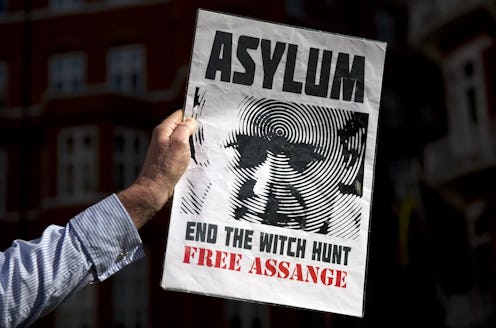News
Where Will The WikiLeaks Founder Get Asylum?
Embattled WikiLeaks founder Julian Assange has tried to get asylum in France in an attempt to evade extradition to the United States, where he may face a trial over the 2010 release of leaked documents believed to be supplied by Chelsea Manning. But France, it seems, won't have him. On Friday, French President Francois Hollande formally rejected Assange's asylum request, leaving the infamous hacker stuck in an international limbo.
Assange made the asylum request in a public plea to Hollande, published Friday in the French newspaper Le Monde. "Mr. President of the Republic, I have the honor to write to you and, through you, to speak to the French people," Assange wrote. "My life is now in danger, Mr. President, and my integrity...is, each day that passes, a little more threatened."
In his letter, Assange describes how the release of the video "Collateral Murder," which reportedly showed the U.S. military maiming civilians in Iraq, resulted in "political persecution of unprecedented magnitude" against him, his family, and his WikiLeaks employees. "This video marked a before and after in my life," Assange wrote in Le Monde.
Assange, who has been living in Ecuador's embassy in London for the last three years, sought asylum in France because his youngest child is French. The WikiLeaks founder, who currently faces sexual assault charges in Sweden, also believed France would be sympathetic to his cause. It's France's chance, Assange wrote, to "fulfill a humanitarian, but also a probably symbolic gesture." Assange added it would send a note of encouragement to all the "journalists and whistleblowers...who risk their lives every day to allow their citizens to take another step closer to the truth."
But Hollande was not having it. Shortly after Assange's plea for asylum went public in Le Monde, Hollande's office released this brief statement:
France has received the letter from Mr. Assange. An closer review shows that taking account into account the legal and material elements of Mr Assange's situation, France cannot grant his request. The situation of Mr. Assange does not present immediate danger. He is also the subject of an European arrest warrant.
That arrest warrant stems from Sweden, where Assange has been under investigation over sexual assault allegations for nearly five years. In May, the Swedish Supreme Court dismissed Assange's appeal to revoke the arrest warrant. "The supreme court finds no reason to lift the arrest warrant,” the Swedish Supreme Court ruled in a statement, according to TIME.
The WikiLeaks founder still faces extradition to Sweden by U.K. authorities. However, what Assange truly fears is Sweden or the U.K. extraditing him to the United States, where a criminal investigation into the document leaked is still ongoing.
"The U.K. refuses to recognize my asylum and guarantee my non-extradition to the United States," which Assange alleges is a violation of the British constitution, he wrote in Le Monde. Currently, Assange cannot leave the building of Ecuador's embassy or else he will be at risk for arrest by U.K. authorities and extradition to Sweden. "Sweden, like the U.K., has repeatedly announced that they would ask my arrest as soon as I get out of the embassy," Assange said in the public letter. Ecuador has continued to house Assange in its London embassy for the last three years, and has made no move to give him up quite yet.Images: Getty Images (1)
